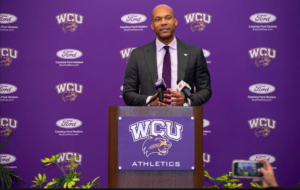Western Carolina University’s athletic director, Alex Gary, has already had his fair share of tribulations less than a year into the role. Gary has had to deal with a global pandemic, athletic cancellations and postponements, racial issues and protests on campus. Despite these challenges, student athletes, coaches and colleagues are thrilled with his performance and notice his hard work.
“Mr. Gary played a big role in the Whee United March. He basically told us that whatever we could agree on as a team we could do…that made us feel like he cared about us more than when we wear a uniform, something I had not felt until he became AD,” said Mahari Stribling, wide receiver at Western Carolina.

Alex Gary, at the podium following his announcement to the position of director of athletics. Photo courtesy of Western Carolina University
Alex Gary, the new WCU athletic director, was announced on Feb. 28, 2020 that he would officially be taking over on May 1, hoping to lead Western Carolina’s athletic department to new heights. Gary, former student athlete at WCU, took the job following a three-year stint at Oregon State University as a senior associate director of athletics and chief development officer.
His former boss, Vice President & Director of Athletics at Oregon State University, Scott Barnes described him as having a “unique and natural ability to connect with broad, diverse groups. He is authentic in developing relationships and is a gifted leader well beyond his years,” in a story on Gary for WCU Athletics.
Prior to his work at Oregon State, Gary was the associate athletics director for development and external relations at the University of Maryland. He also held development officer positions at University of Michigan and University of North Carolina at Charlotte.
Gary now holds the honor of not only being the first African-American athletic director at Western Carolina, but the first full-time African-American athletic director in the history of the Southern Conference.
“Having an AD of color, and a former athlete from this school, is great because he can fully understand our situation. It is not common to see an AD of color, so for him to be here is really special,” said Kameron Gibson, guard for WCU Men’s Basketball team.
Gary, played baseball at WCU from 2001 to 2004. He transferred to Virginia Commonwealth University to finish his undergraduate career and earn his bachelor’s degree in business administration in 2005. Following his final year in college, Gary spent the next few years playing minor league baseball in the Seattle Mariners organization before ultimately being released. After his stint in the minors, Gary decided to further his education and obtain a master’s in business administration from the University of North Carolina in Charlotte.
Charles Gadie, defensive back at WCU, says “having a former WCU athlete as an athletic director is perfect because Mr. Gary has history, not only with the school but athletics in general. He knows what it feels like and what it takes to satisfy an athletic program and team.”
The athletic director job took a drastic turn for Gary following the novel coronavirus outbreak leading to his first challenge as the new athletic director. The National Collegiate Athletics Association canceled its yearly “March Madness” tournament on March 12 only to be followed by the Southern Conference cancelling all spring competitions on March 17 and fall conference competitions postponed on Aug. 13. Within five months, two-thirds of a collegiate athletic year had either been cancelled or postponed. Due to this loss, Gary had to find a way to supplement the missing revenue. The ability to play non-conference footballs games against Liberty University, Eastern Kentucky, and the late addition of University of North Carolina at Chapel Hill was crucial. This first year at WCU has been hard.
“When you have got 75 staff members, 350 student athletes trying to provide them with clarity on what next week looks like when you don’t have it is extremely tough,” Gary said in a zoom interview.
Taking on the role as a new athletic director is difficult in its own right, but then to add in a global pandemic and a boycott of athletic activities from the student athletes following racist remarks made by fellow students has made this transition even more difficult. Gary had his struggles but is very proud of his staff and the student athletes for their calls to action.
“One of the things I am most proud about is being able to work with our administration and our students, especially our football students, who started the ‘Whee United’ rally and being able to be there for the students to support them being able to use their voices,” Gary said.
Ultimately, Gary is thrilled to take on the role of athletic director at his alma mater.
“Outside of social justice and COVID, I am really looking forward to helping our institution’s Athletic Department raise the level of our expectations for success,” Gary said.
Among becoming an athletic powerhouse in the SOCON, his plan is to improve athletic facilities, ensure a first-class experience for athletes both athletically and academically, provide athletes with an alma mater they can be proud of, and give athletes a network of people available to help them succeed beyond their sport.
“Western Carolina is a fantastic school with so much potential. We have been able to have a lot of success, but I want to continue to raise the expectations of what success looks like,” Gary said at the end of our interview.



